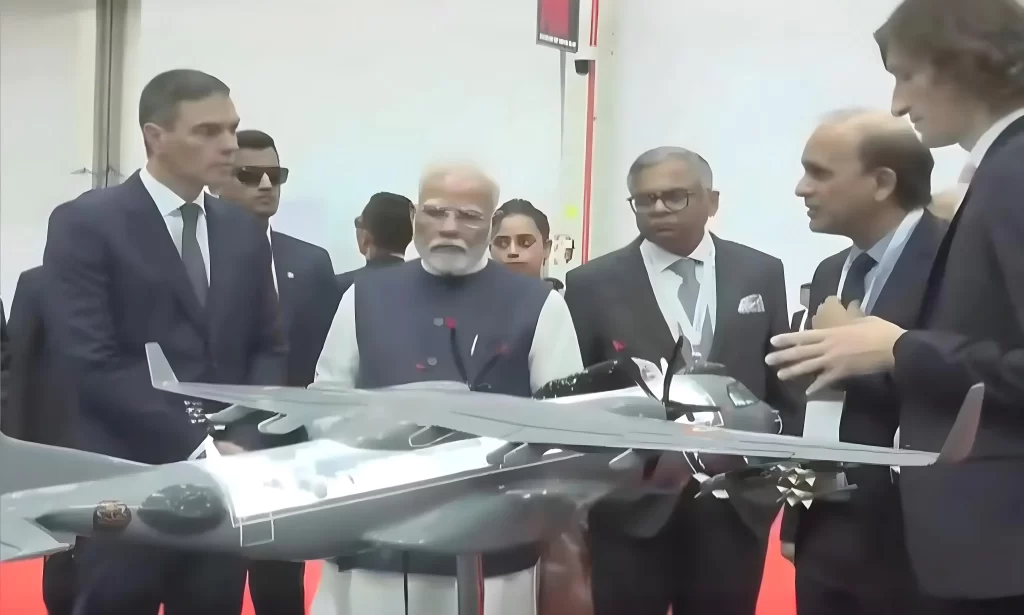In a landmark moment for India’s aerospace industry, Prime Minister Narendra Modi inaugurated the Tata-Airbus C-295 Aircraft Manufacturing Facility in Vadodara, Gujarat, alongside Spanish Prime Minister Pedro Sanchez. This facility will produce 40 of the 56 aircraft ordered under the C-295 program, with the remaining 16 to be delivered directly from Spain by Airbus. This plant, the first private-sector Final Assembly Line (FAL) for military aircraft in India, is part of a ₹21,935-crore contract signed in 2021 with Airbus. Honoring the late Ratan Tata, a key visionary behind the project, PM Modi emphasized the role this facility will play in fostering India’s “Make in India, Make for the World” initiative.
Prime Minister Narendra Modi today officially inaugurated the Tata-Airbus Aircraft Complex in Vadodara, Gujarat, marking a significant step in India’s aerospace development. The state-of-the-art facility, created in partnership with Airbus, will manufacture C-295 military transport aircraft, a vital asset to India’s defense infrastructure. PM Modi was joined by Spanish Prime Minister Pedro Sanchez, reflecting the international collaboration involved in this initiative.
The C-295 program comprises a total of 56 aircraft, ordered by the Indian Ministry of Defense to replace the Indian Air Force’s aging Avro-748 fleet. Out of these, 16 aircraft will be delivered from Spain, while the remaining 40 will be assembled in Vadodara, underscoring India’s commitment to developing a robust local aerospace manufacturing industry. This new Tata-Airbus facility represents the first private-sector Final Assembly Line (FAL) for military aircraft in the country, setting a precedent for future defense collaborations. This ambitious venture is part of a ₹21,935-crore contract signed between Airbus Defense and Space SA, Spain, and the Ministry of Defense in 2021.
At the inauguration ceremony, PM Modi highlighted the importance of this project, stating, “The Tata-Airbus manufacturing facility will strengthen the India-Spain relations and the ‘Make in India, Make for the World’ mission.” He also paid tribute to the late Ratan Tata, who was pivotal in envisioning this project. Reflecting on his legacy, PM Modi remarked, “Recently, we lost the country’s great son Ratan Tata ji. If he had been among us today, he would have been happy, but wherever his soul is, he would be happy.”
Tata Sons Chairman N Chandrasekaran shared the origin story of the project, emphasizing Ratan Tata’s foresight. “I will fail in my duty if I forget to mention that this project was originally conceived more than a decade ago, in 2012, by the then Tata Sons Chairman, Ratan Tata ji, who led the whole concept to build a relationship with Airbus and created this partnership with Airbus and laid the foundation stone for this opportunity. So, I would like to remember him for his visionary leadership in this very path-breaking initiative,” said Chandrasekaran.
Spanish Prime Minister Pedro Sanchez echoed these sentiments, acknowledging the Tata Group’s role in propelling India’s industrial landscape forward. He stated, “Tata is probably the best exponent of Indian industrial strength. Its products and services are present in virtually every country on the planet. Tata is a giant among giants.” Sanchez further added that this facility will bolster the Indian aerospace sector and attract other European companies, noting that it will be a “symbol of industrial excellence, an engine of growth and a testament to the close and growing friendship” between India and Spain.
The C-295 aircraft is a modern, tactical transport aircraft with a payload capacity of 5-10 tonnes, specifically chosen to replace the Indian Air Force’s outdated Avro-748 planes. Known for its agility, durability, and efficiency, the C-295 can transport up to 71 troops or 50 paratroopers, making it highly effective for logistic missions and tactical operations, even in remote regions where larger aircraft cannot operate. The C-295 boasts a flight endurance of up to 11 hours and is designed to withstand diverse environments, from deserts to coastal regions, while enabling quick reaction missions. Its rear ramp door allows rapid para-dropping and cargo loading, and its short take-off and landing capabilities make it versatile for semi-prepared airstrips.
A notable addition to the aircraft is the indigenous Electronic Warfare suite, developed in collaboration with Indian defense public sector undertakings Bharat Electronics Ltd and Bharat Dynamics Limited. This advanced technology will enhance the aircraft’s operational efficiency and provide robust defense capabilities.
With this new facility, India’s aerospace and defense sectors stand poised for accelerated growth, empowered by local manufacturing capabilities. The Tata-Airbus collaboration is expected to generate thousands of jobs, fostering a sustainable ecosystem for aerospace production and providing a boost to India’s export capabilities. As PM Modi pointed out, this manufacturing hub aligns closely with India’s mission to create a self-sufficient defense industry, and the facility’s aircraft may even be exported in the future.
The Tata-Airbus C-295 manufacturing plant in Vadodara is set to drive industrial innovation and reinforce India’s position in the global aerospace landscape.

